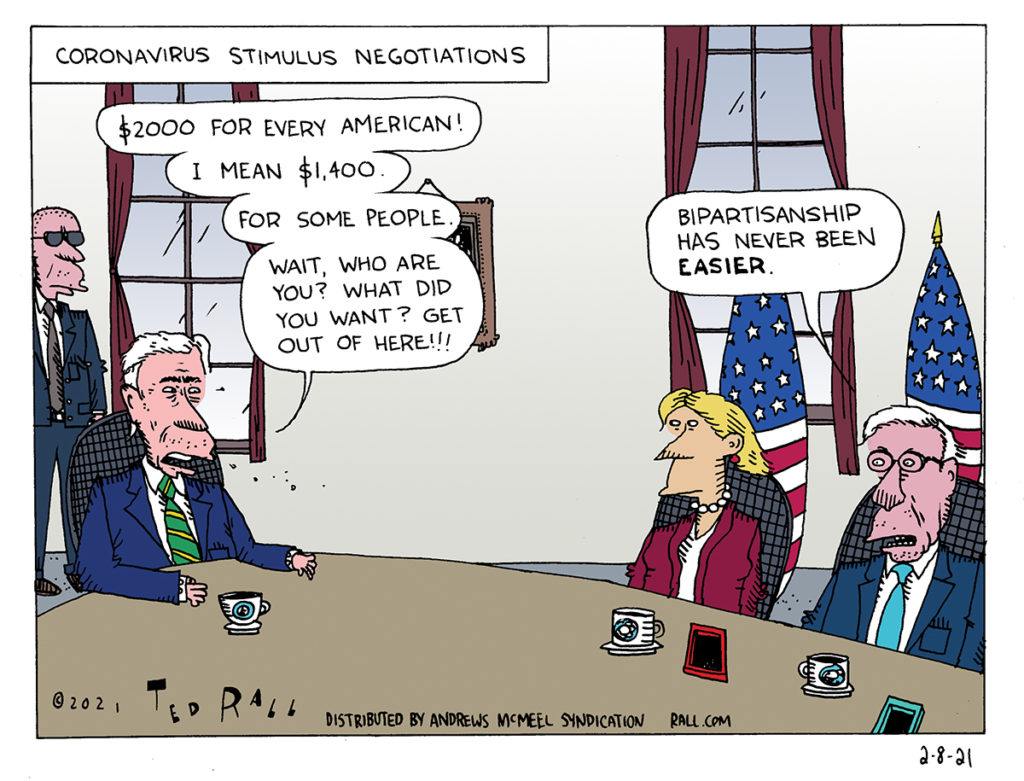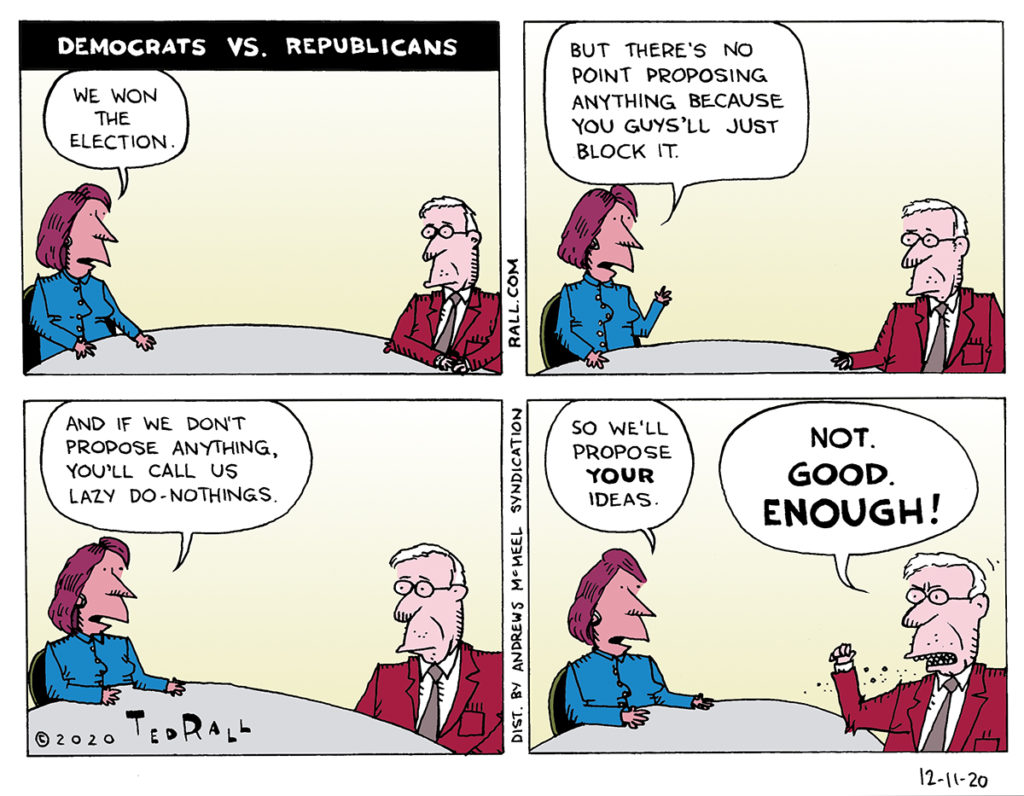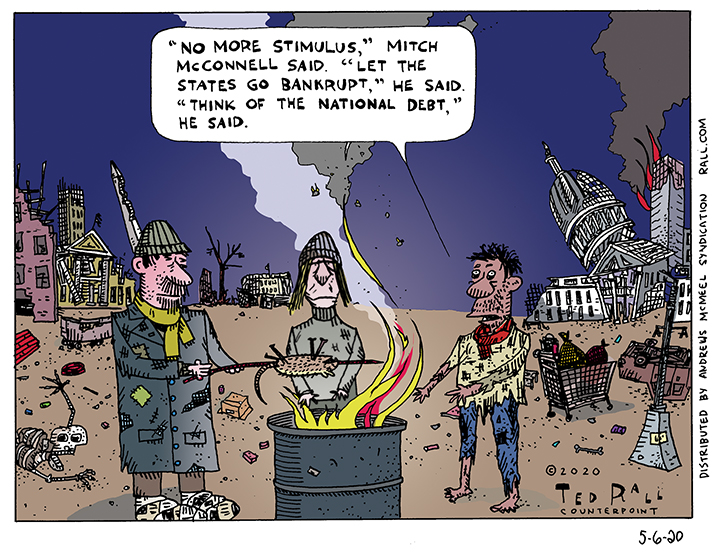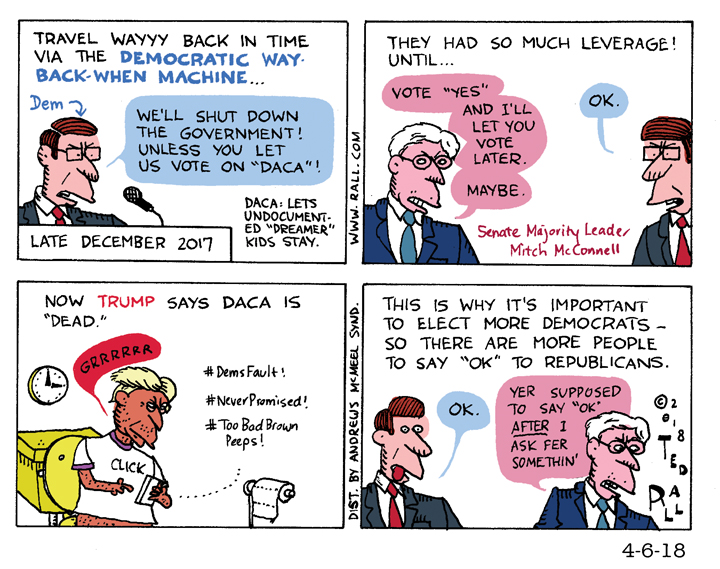Joe Biden promised that every American would receive a $2000 stimulus check. Then he reduced it to $1400 because Trump had already sent out $600. Now he saying it’s going to be a means tested. It’s like he’s negotiating against himself. Evidently the Republicans won’t have that much trouble getting along with him.
Previewing a Biden Presidency: Dementia, Impotence, Collapse
At this writing two days after the election, Joe Biden appears to be six electoral votes away from winning the presidency.
The Trump campaign has requested a recount in Wisconsin. Republicans are suing in Wisconsin, Michigan, Georgia, Pennsylvania and Nevada to demand the right to observe vote counts and challenge absentee and COVID-related mail-in ballots.
Recounts rarely change the outcome of an election, and never do so when the margin is significant, which it is in Wisconsin. The filing is a doomed Hail Mary pass—a delaying tactic at best. Trump’s fading hopes remain, as I have written previously, with the obscure 12th Amendment to the United States Constitution. If legal challenges prevent another state from certifying its results to the electoral college by the December 14th deadline, the incoming House of Representatives votes by state delegation for the new president. Most states are Republican so Trump would win.
With Biden a single state away from legitimately declaring victory, however, the one to focus on appears to be Nevada. Of the states still in light-blue or light-red play, it’s the only one leaning toward Biden, by 0.6%. If Trump can reverse that trend, possibly by disqualifying Democratic votes, he may remain in the White House. But Trump’s legal challenges in Nevada, though technically still alive, face long odds.
So the wind is at Biden’s back, even if it feels more like a mild breeze. Which makes it a good time to consider what a Biden presidency could/will look like.
Few presidents in American history have entered the White House as politically impotent as Joe Biden. No Democrat since and including Andrew Jackson has ever been elected without Democratic control of both houses of Congress, as Biden will face GOP control of the Senate. (The most recent Republican to face congressional opposition on day one was Ronald Reagan in 1981.)
Biden’s inverse coattails made history: Democrats lost five seats in the House. They had expected to pick up 15.
After months of smugly predicting a blue wave landslide, Democrats can’t possibly argue that they enjoy a national mandate for significant change. This margin is too tight and too similar to the electoral college map four years ago. They are already arguing that Biden won more votes than any other candidate in history. But Republicans were energized too. Trump won the second highest. Could the Democratic Party’s endlessly fruitless search for anti-Republican Republican swing voters finally be finished?
Biden’s advisers have to be obsessing over the words of former House speaker John Boehner in 2010: “We’re going to do everything — and I mean everything we can do — to kill it, stop it, slow it down, whatever we can.” “It” was President Obama’s agenda. Senate minority leader Mitch McConnell added at the time: “The single most important thing we want to achieve is for President Obama to be a one-term president.” McConnell is even more of an obstructionist today. And now he’s the majority leader.
Even if Joe Biden were predisposed to a bold agenda, which progressives have a good reason to doubt, McConnell will block the crap out of it. Unlike Obama, who had a Democratic supermajority in the Senate, Biden will have a valid excuse to accomplish nothing. If I were him, I’d sleep in every day.
And that’s assuming that he is able to function in the first place. All the Democratic denials in the world can’t hide the possible president-elect’s worsening dementia. At a recent campaign event Biden introduced his granddaughter as if she were his dead son: “This is my son, Beau Biden, who a lot of you helped elect to the senate in Delaware.” Wrong gender, wrong generation, wrong sentience. He tried to correct himself. “This is my granddaughter, Natalie.”
Actually, Natalie is a different granddaughter. His son Beau died five years ago. Beau never even ran for the Senate. This is dementia, not “stuttering.” It’s sad. It’s also scary. As commander-in-chief, Biden can single-handedly launch a nuclear attack.
Biden’s defenders point to evidence that Reagan suffered from Alzheimer’s, but there was zero evidence of the disease when he took office in 1981. Woodrow Wilson suffered cognitive decline after a stroke, but that was toward the end of his second term. Biden will be the first president to begin his first term with clear signs of dementia.
An old joke goes: I want to die like my grandfather, in my sleep. Not screaming like the passengers in his car. Joe Biden is about to drive the country off a cliff and he may not even know it.
Impotence, dementia and gridlock. This is exactly the opposite of the strong leadership we require during a medical and economic crisis of staggering proportions. The best way to avoid collapse is for Biden to step down and hand the reins to Kamala Harris.
(Ted Rall (Twitter: @tedrall), the political cartoonist, columnist and graphic novelist, is the author of the biography “Political Suicide: The Fight for the Soul of the Democratic Party.” You can support Ted’s hard-hitting political cartoons and columns and see his work first by sponsoring his work on Patreon.)
Never Trump, Never Biden: the Progressive Case for Voting Third Party or Boycotting the Election
Republicans will vote for Trump no matter what. Democrats will vote for Biden no matter what. This column is for progressives weighing the pros and cons of succumbing to the two-party trap, and voting for Biden.
Unless you’ve been sucking through a ventilator in a COVID-19 ward for the last few months, you know the argument in favor of swallowing your disappointment that neither Bernie Sanders nor Elizabeth Warren are the Democratic nominee, resisting the temptation to punish the DNC for rigging the primaries, and forgetting Joe Biden’s right-wing voting record and Kamala Harris’ penchant for locking up innocent people of color and throwing away the key: Trump is a monster, his second term will bring fascism to America, Biden will be more amenable to pressure from the left than Trump.
Except for the part about Trump being a terrible human being, the call to sell out is all based on nonsense.
Reelecting Trump would send a nasty symbolic signal to the world but his actual presidency will almost certainly be characterized by the plagues of lame duckery. Second terms are worthless. Presidents don’t get anything done during their second term. Even FDR floundered. Whatever you think of Trump, does this president strike you as a brilliant Machiavellian tactician who has been holding back his most extreme instincts for four years? Smarter than Reagan, Clinton or Obama? Should Trump be reelected, he will almost certainly be impeached again. Allies like Mitch McConnell will drift away. He may face prosecution.
Some progressives are vulnerable to the argument that, though far from ideal, a neoliberal warmonger like Joe Biden nevertheless represents an improvement over Donald Trump. That argument fails.
Left-of-center electoral politics in the United States is not like football, a game in which a team moves the ball down the field in incremental steps. Mainstream corporate-owned Democratic Party politics is not on the same continuum as progressivism. Neoliberalism isn’t watered-down progressivism; progressivism isn’t a more robust form of neoliberalism. They are opposing ideologies. Progressives and centrists are enemies. When neoliberal centrists achieve power, progressives find themselves in the political wilderness. Obama didn’t have a single progressive in his cabinet. Biden doesn’t have any progressive top advisors.
Corporate Democrats ignore progressives. They crush them. Two major protest movements emerged under Obama, Occupy Wall Street and Black Lives Matter. Obama deployed the surveillance state to eradicate both. Ask Julian Assange and Edward Snowden how amenable corporate Democrats like Obama are to progressive demands for change. It would be idiocy to expect anything different from Biden, who just appointed an out-of-control former prosecutor during a period of unprecedented protest against police brutality.
Would Biden be better than Trump? Only in temperament. Qualitatively, Biden presents a friendlier face for a pro-business domestic agenda that features few substantial differences with the Republicans. Under his proposed Democratic administration, we can expect to see a continuation of a tax structure that favors wealthy individuals and corporations, shrinking union power and rising income inequality, a horrible for-profit healthcare system, and systemic police violence directed disproportionately against people of color and the poor.
Understandably, there is trepidation about the possibility of Donald Trump naming a successor to Supreme Court Justice Ruth Bader Ginsberg, who is ailing. Even if Democrats control the Senate after January, and Biden pushes through a liberal—which, given his record, is unlikely—the overall balance of the court will not change. It is a conservative court and it will remain one.
In foreign policy, there is far less cause for optimism. From Bosnia to Afghanistan to Iraq to Libya to Syria, Joe Biden has enthusiastically voted for and convinced his fellow legislators to support brutal foreign interventions. Though disgusting, Trump’s record is nevertheless far better than Biden’s. Trump has expanded Obama’s drone wars and supports the bloodthirsty Saudi regime in the proxy civil war in Yemen. Yet he also negotiated a deal for total U.S. withdrawal from Afghanistan and repeatedly expresses his willingness to negotiate with such adversaries as North Korea and Iran without pre-conditions.
Neither Trump nor Biden will do anything that progressives really care about. Neither will support the Green New Deal or, for that matter, doing anything real about climate change. Neither is in favor of student loan forgiveness. Neither will take the profit incentive out of healthcare.
Some progressives worry about “wasting their vote” on an outfit like the Green Party. What could be more of a waste than voting for someone who is against everything you care about?
In high school civics class they told you that a single vote can make a difference. They lied. Not in a national election. Not at the state level of a national election. In the closest battleground state of 2016, New Hampshire, Clinton beat Trump by 2,701 votes. Sure, if you and thousands of other folks vote the same way, outcomes can change. But you have no control over other people. You have one vote. That’s all. Even if you live in Ohio, you personally can’t change anything. So live free.
On the other hand, withholding your vote from the Democratic Party can have a positive impact. Several million primary voters cast ballots for Bernie Sanders in 2016 but stayed home in the general election. Primary voters are fanatics—only 12% turnout compared to about 55% in the general election—so when they don’t show up it’s a boycott, not apathy. After Hillary lost, party insiders concluded they would have to move left in order to motivate progressive base voters. Many contenders in the 2020 Democratic primaries espoused elements of Bernie Sanders’ platform. Without the 2016 progressive boycott, that never would have happened.
If you are trying to send a message with your vote, voting for a third party is likelier to register with analysts than staying home on election day.
Voting for Biden sends only one message: you approve of him and his politics. Why, after getting the milk for free, would he pay attention to any of the cow’s complaints?
(Ted Rall (Twitter: @tedrall), the political cartoonist, columnist and graphic novelist, is the author of the biography “Political Suicide: The Fight for the Soul of the Democratic Party.” You can support Ted’s hard-hitting political cartoons and columns and see his work first by sponsoring his work on Patreon.)
Delay the Election? Presidents Often Do Things They Can’t Do
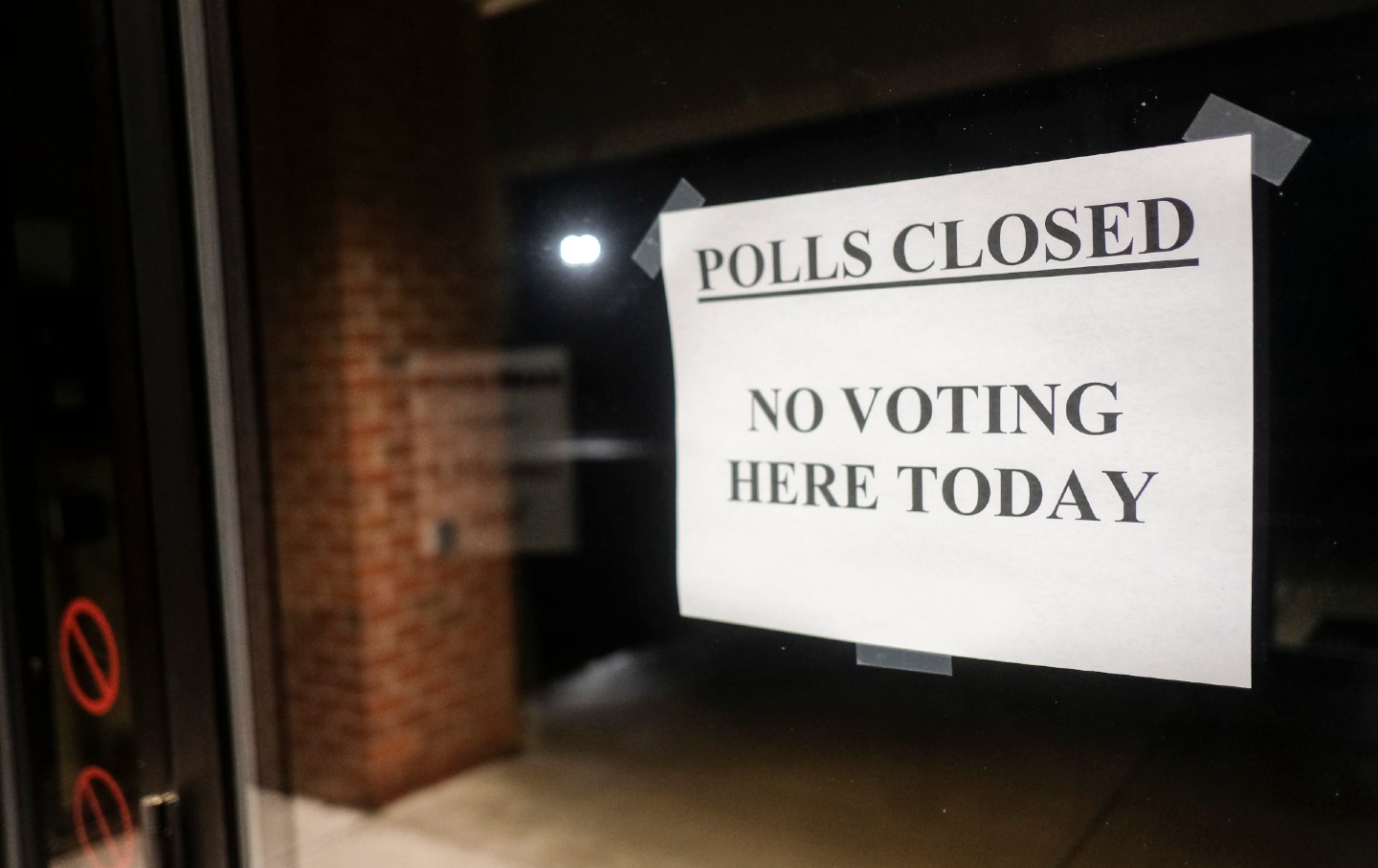 The stock response to President Donald Trump’s suggestion that the general election might be delayed because voting during a pandemic would involve a record number of mail-in ballots, a format he argues is unreliable and susceptible to fraud, is that he doesn’t have that power.
The stock response to President Donald Trump’s suggestion that the general election might be delayed because voting during a pandemic would involve a record number of mail-in ballots, a format he argues is unreliable and susceptible to fraud, is that he doesn’t have that power.
NBC News is typical: “The president has no power to delay an election.” [Emphasis is mine.]
What the president understands, and most mainstream commentators fail to accept, is that it is easier to ask for forgiveness than to get permission. That goes double when the powers in question are limited by a document that lies in tatters, repeatedly ignored.
Liberal politicians and news outlets point out that the Constitution assigns the scheduling of elections exclusively to Congress. Republicans tepidly (and troublingly) stopped short of denying Trump’s power to push back the big day, while insisting that the election ought to take place on time. “Never in the history of this country, through wars, depressions and the Civil War, have we ever not had a federally scheduled election on time. We will find a way to do that again this November 3rd,” Senate Majority Leader Mitch McConnell said.
In an era of rampant cynicism it is sweetly naïve and the amusingly charming to see Americans put so much faith into the constitutional checks and balances they learn about in high school civics class. “‘Trump can’t delay the election,’ experts say,” reads a headline in The Washington Post.
Since when has a 221-year-old piece of paper stopped presidents from doing anything?
I think first of war powers. Article 1, Section 8 of the U.S. Constitution clearly states that the right “to declare war” resides exclusively with Congress. Such key founders as George Washington, James Madison, Thomas Jefferson and Alexander Hamilton—men whose right to define original intent can hardly be questioned—believed that presidents could not dispatch troops without legislative approval except in cases of immediate self-defense. Congress signed off on sending soldiers and sailors to the Quasi-War with France in 1798, naval conflicts with the Barbary States of Tripoli and Algiers, and clashes with Native American tribes in the West.
Congress has since abdicated its war-making powers to the executive branch. Congress hasn’t issued a formal declaration since World War II. Yet we have fought countless wars. Presidents have launched military attacks against Korea, Vietnam, Libya, Grenada, Lebanon, Panama, Serbia, Syria, Iraq and Afghanistan. Some of these wars of aggression were legalistically constructed as “police actions” or “peacekeeping missions” under the aegis of the UN. The fact remains, this is not what the drafters of the Constitution intended. And it has never been amended. Presidents do what they want; lawyers twist logic to justify their illegal slaughters.
President Abraham Lincoln earns democracy points for holding the 1864 election during the Civil War. Yet he suspended habeas corpus and ignored a ruling by the chief justice of the U.S. Supreme Court saying that he didn’t have the power to do so. George W. Bush’s Military Commissions Act of 2006 also suspended habeas, for anyone the U.S. government arbitrarily defined as an “enemy combatant.” Until the Supreme Court ruled against him two years later, Congress was complicit with the MCA. Even after the court ruling, the internment facility at Guantánamo Bay remains open; 40 men remain there, not one of whom has ever been charged or tried under basic constitutional standards.
FDR almost certainly didn’t have the constitutional right to send 127,000 Japanese-Americans to internment camps during World War II. Yet he did.
From domestic surveillance by the NSA that violates the agency’s founding charter to asset forfeiture programs that allow the police to seize money and property from people who have never been charged, much less convicted of a crime, Americans live in a society oppressed by a political class that takes no notice of constitutional limits it deems inconvenient.
Does the president have the legal right to delay an election? No.
Does he have the power? Yes, unless We The People refuse to accept it.
(Ted Rall (Twitter: @tedrall), the political cartoonist, columnist and graphic novelist, is the author of the biography “Political Suicide: The Fight for the Soul of the Democratic Party.” You can support Ted’s hard-hitting political cartoons and columns and see his work first by sponsoring his work on Patreon.)
3 Things the Government Must Do to Avoid Economic and Social Collapse

Americans don’t expect much from their government. But even by the standards of a nation with one of the flimsiest social safety nets in the Western world, the inability and unwillingness of both major political parties to manage and solve the crisis caused by the coronavirus pandemic is shocking.
President Trump’s lack of leadership is well documented elsewhere so I won’t go into detail here. Democrats aren’t blameless; the DNC-engineered pre-Super Tuesday soft coup against Bernie Sanders replaced a frontrunner whose prescient ideas were tailormade for this crisis with a babbling dolt without an original thought in his foggy brain.
Congress is squabbling over an economic stimulus package as if they had all the time in the world. My favorite part was Mitch McConnell letting the Senate take the weekend off. Hey, Japan, not cool about Pearl Harbor but we’ll get back to you about declaring war in a week or whatever. Meanwhile, experts predict that unemployment could go as high as 30%, significantly worse than the depth of the Great Depression.
But now is not the time to cast blame. The ship is sinking. We can make the captain walk the plank later. Right now we have to fix the problem.
First, we have to save lives.
Trump says he doesn’t want to “nationalize” American companies. Actually, no one’s suggesting that. But they should. This is still a spectacularly wealthy nation with incredible resources and brilliant entrepreneurs. Shortages of face masks, testing kits, ventilators, rubbing alcohol and so on are inexcusable. The federal government must immediately requisition factories, hire workers directly and place manufacturing of needed supplies on an emergency war footing. If a company is already set up to make something we need yet refuses to do so, it should be nationalized and put to work for the American people.
In the fight against COVID-19, the biggest danger to the privileged is the poor health of the underprivileged. You can hunker down in the Hamptons but your newly-purchased freezer full of hoarded steaks won’t protect you from infection as long as others are too vulnerable to protect themselves. Some of the 17 million vacant homes in the United States should be immediately seized to house America’s half a million homeless and other vulnerable populations. The vast majority of prisoners, many of whom are awaiting trial, convicted of minor offenses or convicted of serious crimes but safe to release, should be immediately released from facilities whose conditions create cesspools of contagion.
Healthcare must be free. Hospitals and doctors should send their bills to the government. That debate, along with the canard that we have the best healthcare system in the world, is obviously over.
Second, we have to save the economy.
I’m not normally one to agree with Thomas Friedman, but he’s right when he points out that economic collapse will kill people on a scale on par with COVID-19: “Either we let many of us get the coronavirus, recover and get back to work—while doing our utmost to protect those most vulnerable to being killed by it. Or, we shut down for months to try to save everyone everywhere from this virus—no matter their risk profile — and kill many people by other means, kill our economy and maybe kill our future.”
I don’t think we really need to “let” many of us get the coronavirus. That has already happened.
News coverage that emphasizes test results is an idiotic distraction. Roughly 1/10 of 1% of American citizens have been tested. We know nothing about the COVID-19 status of 99.9% of the population. We don’t call elections based on 0.1% of the poll results and we can’t draw real conclusions from the testing so far.
However, there is reason to believe that many, many people have already had it.
Roughly one out of five people who get the coronavirus will never know it because they are asymptomatic. COVID-19 was first identified in early December in Wuhan, China. Although the median incubation period is 5 days, it can be as long as 11 days. That means we are talking about a pandemic that dates back to late November 2019.
When did it arrive in the United States? Probably in a day or two, the amount of time it took for one asymptomatic and/or incubating carrier—people like this account for about 10% of new infections—to board a plane and fly across the Pacific Ocean. Roughly 10,000 people a day flew from China to the United States at that time.
This is not a new thing—and you should feel good about that.
Let me explain.
The number of new cases in the U.S. has been doubling about every three days. Get a calculator and start multiplying by two: 2, 4, 8, 16, 32, 64, 128, 256, 512, 1024. That’s 10 three-day periods, aka the month of December. Keep going. By the end of January you’re at over a million. By February, a billion. The U.S. population is about 330 million. So when New York governor Andrew Cuomo says that 40 to 60% of the population is going to get the coronavirus, he’s being conservative.
The rate of transmission will stop increasing exponentially at some point. Some patients will die. The virus will run out of new Americans to infect. But mostly, we are going to recover and emerge with full or partial immunity to COVID-19. Many, many Americans have already had coronavirus, recovered, and are now fine.
Must they stay at home too? Maybe not. The U.S. government must pull out all the stops to test everyone, not just for current infection, but for past infection. A team at Mount Sinai Hospital in New York has developed a promising test for acute respiratory syndrome coronavirus 2 (SARS-CoV-2) that lets you know if you’ve ever had it. We don’t know if it’s possible to be reinfected by coronavirus or, if so, whether a second bout would be equally or less severe. But there are promising signs that the human immune response can tackle COVID-19.
If COVID-19 patients can emerge with total or near total immunity to the strain, they can help people who are sick. There’s no risk of them transmitting the infection or of contracting it. They are the key to restarting our economy. We can’t waste a moment finding those people and getting them back to work.
Third, we have to save people’s individual economies.
As we saw after the 2008-09 Great Recession, there’s not much point saving banks or corporations or the stock market without targeting individual American citizens for direct relief. Bernie Sanders has proposed that the United States Treasury pay out $2000 per person per month until the end of the coronavirus crisis. Sounds right.
Republicans want an absurd regressive form of means testing—the poorer are you are, the less you would receive. Saying they don’t want to subsidize millionaires, Democrats like Nancy Pelosi also want means testing but from the other direction.
Both are ridiculous. There’s no time for detailed analysis or a new government bureaucracy to determine who gets what. Checks and wire transfers need to go out yesterday. So what if Bill Gates gets one?
It’s time to act, not to blame. But if there’s no action or if the action is late and/or insufficient, there will be plenty of blame to go around. And there will be no limit to the rage of the survivors who are suffering against politicians who did not do what was needed to be done.
(Ted Rall (Twitter: @tedrall), the political cartoonist, columnist and graphic novelist, is the author of the biography “Bernie.” You can support Ted’s hard-hitting political cartoons and columns and see his work first by sponsoring his work on Patreon.)
SYNDICATED COLUMN: How Brett Kavanaugh Framed Himself as a Martyr to the #MeToo Movement
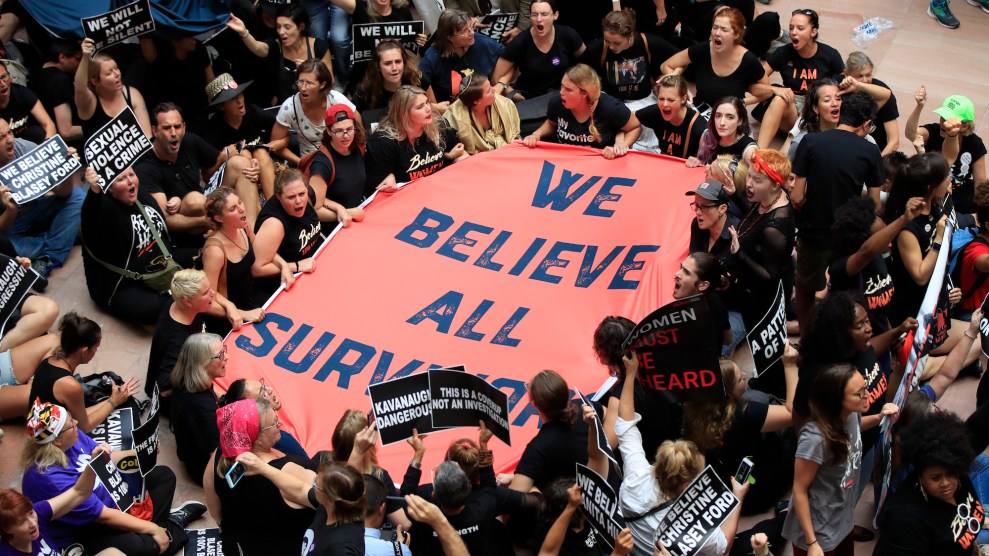
Innocent until proven guilty. Senate Majority Leader Mitch McConnell floated a lot of arguments to defend Brett Kavanaugh, but that’s the one that carried the day: “We owe it to the American people to underscore that you’re innocent until proven guilty.”
The Kavanaugh confirmation battle was a grenade wrapped in an onion covered with more poisonous sexual politics than “The World According to Garp.” Yet in the end it was simple. Presumption of innocence was the argument that SWINO (SWing vote In Name Only) Senator Susan Collins used to justify treason to her gender.
“This is not a criminal trial, and I do not believe that claims such as these need to be proved beyond a reasonable doubt,” Collins said, announcing her crucial support for the controversial Supreme Court nominee. “Nevertheless, fairness would dictate that the claims at least should meet a threshold of more likely than not as our standard.”
Once again Democrats asked themselves: what the hell happened? Why did we lose a fight we should have won?
Trump’s defeat of Clinton, Bush v. Gore, the 1940 Fall of France — those were perfect storms with numerous contributing factors. Not this one. Kavanaugh made it to the Supreme Court because his allies framed #MeToo as an out-of-control mob of man-haters.
Remember when Dr. Christine Blasey Ford’s accusation that Kavanaugh tried to rape her in high school first hit the news? Republicans were on their heels at first. Polls showed that a plurality of voters didn’t want him confirmed, the worst showing of any high court nominee since they began asking the question. Then came the one-two punch: Yale classmate Deborah Ramirez said Kavanaugh exposed himself and tried to force her to give him oral sex. Even with a Republican Senate, Kavanaugh was in real trouble.
Anti-Kavanaugh sentiment peaked after the marathon nine-hour hearing in which Ford and Judge Kavanaugh testified about her allegations. A PBS/NPR/Marist poll found that 45% of Americans believed her. Only 33% believed him. If that’s where things had remained nine days later when the Senate voted, Collins and other wobbly GOP senators might have voted nay.
#MeToo came to their rescue.
Nothing unites a party like a common enemy. That goes double when the adversary allows itself to be framed as scary and unreasonable.
As the Kavanaugh vote drew nearer #MeToo activists became increasingly aggressive. They chased senators down hallways, cornered them in elevators, doxxed them and picketed their homes. Ted Cruz was confronted at a restaurant. “We Believe Survivors!” activists shouted as he fled.
Direct tactics hold politicians accountable for their sins. Confronting right-wing senators, none of whom gave a damn about the possibility that they were about to put an attempted rapist on the Supreme Court, going after them one-on-one was empowering for victims of rape and sexual assault and the millions of victims they represented. It was more than fair; it was justified.
But it didn’t turn out to be smart.
The optics and audio of all that yelling were ugly, particularly to Republican-leaning voters. Shouting incoherently — you couldn’t hear what they were saying on TV — during hearings looked rude and hostile. Screaming at elderly senators as they ran down capitol corridors exuded chaos.
They shouted and carried signs bearing the mottos of #MeToo:
Believe survivors.
Believe women.
Such powerful words. Also sloppy. “We are worried as mobs chant, ‘We believe survivors!’ (What if Ford is not truly a ‘survivor’? Don’t we have to establish whether she’s a survivor first?),” Stephanie Gutmann, a Republican, wrote in USA Today.
#MeToo is a kind of revolution. Because revolutions follow years of resentment piled upon eons of abuse, their imperative to destroy what’s broken and evil necessarily leads to intemperance. Nowhere is the revolutionary impulse toward careless imprecision more evident than in rhetoric. So it is with #MeToo — what began with an uprising no reasonable person could oppose, against bonafide monsters like Harvey Weinstein, inevitably cast its net wider into the gray area of Aziz Ansari.
As the targets of #MeToo expanded from the undeniably disgusting to garden-variety piggishness, the slogans of the movement became more militant, more thoughtless, further out on a limb.
Official policy at HR and the local PD had always been “ignore women.” A rational corrective to “ignore women” would be “listen to women.” Accusers deserve respect, to be taken seriously. So do the accused. But revolutions don’t reform the old order. They destroy it.
“Believe women” doesn’t make sense to a society whose core judicial fiction is the presumption of innocence. In America no one, neither men nor women, neither accusers nor the accused, earns the right to be believed by virtue of their gender. Being believed is a zero-sum right, one that inherently comes at the expense of another person and so must be earned by a combination of corroborating evidence, witnesses and the intangible social currency of credibility.
Sensing that #MeToo had overreached, yelling too loudly and deploying slogans that reeked of overcorrection, McConnell and his fellow Republican leaders rallied their party’s base in two steps.
A Supreme Court confirmation hearing usually feels like a job interview. Despite Susan Collins’ denials the Republicans did everything they could to frame Kavanaugh’s as a trial instead, complete with a hired-gun prosecutor from Arizona to provide a veneer of legalishness.
After they’d made the spectacle look and feel like a trial it was easy to convince fence-sitting moderate Republican viewers that to be denied his seat Dr. Ford and her Democratic allies would have to follow the familiar rules of a criminal proceeding: establishing guilt beyond a reasonable doubt, adhering to sharing of evidence (which is why they attacked Dianne Feinstein for withholding Ford’s letter), the burden of proof on her, not him.
Of course, the fix was in. Ford was the one really on trial; she fended off the questions of the rent-a-DA whereas Kavanaugh didn’t have to. It was all so clever. Once Democrats allowed Republicans to set the bar at beyond-a-reasonable-doubt guilt — something the he-said-she-said nature of the 36-year-old allegation made impossible — Kavanaugh was in like Flynn.
Shaunna Thomas of the women’s group UltraViolet Action, said: “This doesn’t end [on Saturday],” she said. “It ends in November.” But not, perhaps, the way she would like. Polls show that Republicans are so energized by their win on Kavanaugh that the Dems’ chance of recapturing the Senate are dropping in part because they’re buying the argument that the #MeToo movement is dangerous. “It’s a very scary time for young men in America when you can be guilty of something you may not be guilty of,” President Trump said in his memorably illiterate way.
Fair or not, right or wrong, the perception of many men is that #MeToo is willing to sacrifice 100 innocent men in order to end the career of one guilty one. In the same way that the civil rights movement needed white allies in order to succeed, #MeToo needs men not to fear them but to support them.
Whatever happens in the midterm elections, the #MeToo movement has arrived at a tactical crossroads. Should we Believe Women? Or Listen to Everyone?
(Ted Rall (Twitter: @tedrall), the political cartoonist, columnist and graphic novelist, is the author of “Francis: The People’s Pope.” You can support Ted’s hard-hitting political cartoons and columns and see his work first by sponsoring his work on Patreon.)
Vote Democratic! Who Else Would Always Consistently Vote Republican?
Are Democrats stupid? Are Democrats corrupt? Are they both? It’s hard to tell sometimes. Most recently, Democrats gave away the leverage that they had against President Trump and the Republicans when they agreed to sign off on a two-year spending deal that favored the Republicans in exchange for a tepid promise by Senate majority leader Mitch McConnell to allow a clean up and down vote on whether or not undocumented people brought to the United States by their parents as children would be allowed to stay permanently. Now the president is saying that there will be no such deal. Democrats aren’t even bothering to complain anymore. So why should anyone vote Democratic?

